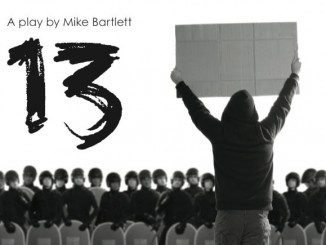
No Exit
The titillating title of the play alludes to the play’s bisexual love triangle as well as the brutal influence of cockfighting on the piece. A contemporary classic of British drama, Cock, penned by Mike Bartlett, is a taut piece of playwriting, each scene escalating towards a deliciously inevitable showdown.
Bartlett opens by dropping us right in the middle of an argument between our protagonist John (Jack Buchanan) and his longtime boyfriend M (Simon Leary). From the first venomous word, we have an immediate understanding of this toxic relationship dynamic. John quickly jumps ship and abandons the relationship, only to come running back almost immediately. The catch? John’s fallen for a woman, W (Karin McCracken). Let the games begin.
Bartlett cleverly structures the play in a non-linear fashion so we get to view John’s relationships with each of his partners separately first. With the first act dedicated to M and the second act to W, before they all meet in the third act. Man versus woman. Gay versus straight. The end of a relationship versus the start of one. The play’s centerpiece, a final showdown between all the characters, or the dinner party from hell, evokes the turbulent black comedy of Edward Albee, liquor pouring and mouths running amok.
Buchanan is well cast in the central role, drawing a portrait of someone who, for all intents and purposes, is deliberately lacking in characterisation. John is a walking ball of indecision, pushed towards whatever direction the current carries him, defined by how little he has defined himself. And, yet, there’s a puppy dog charm to him. When Buchanan as John talks about his eyes as his best feature, it doesn’t feel like narcissism but a bashful fact. And when he struggles, we can see every inch of him barely holding himself together.
Leary, following his performance from A Doll’s House, continues a hot streak of playing oppressive domestic partners. But instead of Ibsen’s archetypal heterosexual husband, M is the stereotypically bitchy gay. Replete with some of the script’s funniest and also most problematic lines, he can come across as a camp caricature ripped right out of The Boys in the Band. But Leary shines in the play’s final dinner scene, where he throws down the gauntlet in the so-called name of love. Beneath the savagery hides a palpable insecurity which puts it all into perspective.
McCraken’s characterisation of W is striking in how clearly we see her transform over the play. Her fierce independence and confidence gives way to a vulnerability that is like an exposed wound. She’s also tender in ways the other characters are not, making her first appearance an immediate breath of fresh air. In lesser hands W might simply seem like a device or catalyst for John’s sexual awakening.
As a special guest to the histrionics of the play, Matt Chamberlain as F brings a refreshing take on blokey, kiwi masculinity to the role. This also has the interesting effect of steeping the world in a more recognisable New Zealand context without tampering with the text.
There’s a fascinating conversation to be had around plays that are not quite old and no longer new, not quite speaking to the right now but not quite timeless yet either. Cock feels somewhat stuck in this limbo, due to its somewhat dated interrogation of sexual politics, but is no less impressive as a piece of writing. The way the play has shifted for me the most is that its conversations around gender, sexuality and assumed monogamy feel half-baked and somewhat reductive in 2019; the characters still trapped in conversations from when the play first premiered a decade ago, a stark contrast to the queer discourse available to us now. M’s nastiness, in particular, while dripping with acid wit, is also laced with a misogynistic sting that’s hard to ignore. And while the play suggests John’s sexuality resists simple catergorisation, another reading of the text might suggest that it perpetuates judging stereotypes of bisexual fence-hopping.
It must be said that sexuality isn’t the sole or central concern of the play though, rather it’s a powerful metaphorical device to convey John’s ambivalence and uncertainty. Bartlett is ultimately more interested in the tyranny of freedom (or lack thereof), as well as the crushing anxiety of choice.
What still makes Cock so thrillingly watchable is the breakneck speed and brutality of the dialogue, which demands linguistic athleticism from its performers. Set on the barest of spaces with no props, the Circa stage is converted into a blank canvas in a thrust configuration. It’s less like watching a conventional drama and more like watching a culture eat itself under a microscope. Rather than miming the shifting locations and objects around them, the blocking is more concerned with the psychological landscape of the space. Characters don’t sit around the dinner table or simulate sex on stage, so much as evoke the tension of every given moment. It’s not revolutionary, but it’s a perfect demonstration of how less can be more. The minimalist design elements, replicating Bosher’s previous productions, are executed flawlessly by Sean Lynch. Scene changes with red or blue lighting and ominous sound cues risk becoming somewhat overbearing at times though.
It’s a privilege to see a director work with the same script (previously for Silo in Auckland) and a new cast. If the play isn’t as fresh and vital as it once was, Shane Bosher’s directing is still as astute and clear as ever, each actor playing their actions as truthfully as possible. You might not always agree with their characters’ decisions, but you can always understand them. Forget about so-called reality TV, Cock reminds us the best emotional bloodsport is on stage. As a devastating study on the abuses of love and power, it’s sadly as incisive as ever. Language is a barbed wire that connects us all. Even affection can be weaponised.
In its closing moments, Cock reveals itself to not be the romantic comedy of manners it’s set up to be, but something closer to an absurdist tragedy. For all the love and desperation trying to claw its way to the surface, the final image reminds us that Sartre was right – hell is other people.
Cock plays Wellington’s Circa Theatre until 9 November.




Leave a Reply